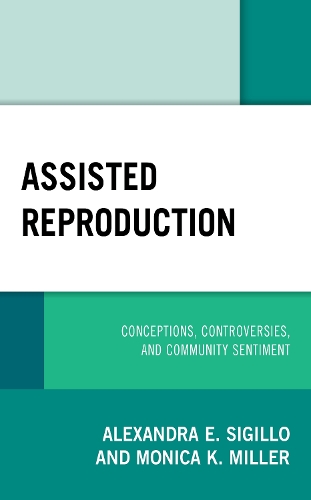
Assisted Reproduction: Conceptions, Controversies, and Community Sentiment
(Hardback)
Publishing Details
Assisted Reproduction: Conceptions, Controversies, and Community Sentiment
By (Author) Alexandra E. Sigillo
By (author) Monica K. Miller
Bloomsbury Publishing PLC
Lexington Books
8th November 2019
United States
Classifications
Professional and Scholarly
Non Fiction
Psychology: sexual behaviour
Health, illness or addiction: social aspects
Social welfare, social policy and social services
Gender studies: women and girls
616.69206
Physical Properties
Hardback
304
Width 160mm, Height 229mm, Spine 29mm
640g
Description
Assisted reproductive technology (ART) allows people who are infertile the opportunity to conceive children and form much desired families. Over the past few decades, the number of ART procedures conducted in the United States has steadily increased, in part affected by the growing number of women trying to conceive later in their reproductive liveswomen trying to pursue careers while balancing personal and societal demands of creating a family. The initial spotlight cast by this demographic shift in baby making has widened as a variety of other people experiencing social infertility (e.g., single persons, same-sex couples) have increasingly used such procedures to conceive their own desired families as well. The spotlight has intensified as media exposure and political attention to the use of ART, particularly by socially infertile people, has aroused public concern and controversy. The purpose of this book is to explore the factors that shape the community's sentimentand thus the controversytoward ART and ART-related laws and policies. Predictors of sentiment include media (e.g., attention, sources), personal differences (e.g., religion, political ideology, beliefs about science), societal influences (e.g., modernization, social norms regarding gender, family, and sexuality), and psychological processes (e.g., cognitive processing, heuristics).
Reviews
Assisted reproductive technologies, including in vitro fertilization (IVF), sperm and egg donation, surrogacy, and germ line genetic modification, have proliferated worldwide in the past forty years. Authors Sigillo (EdSurge, Inc.) and Miller (Univ. of Nevada, Reno) explore factors that influence and shape people's knowledge and sentiments regarding these technologies, their applications, and how they are regulated through law and policy. Chapter 2 discusses how the technologies in turn may influence family law. Succeeding chapters provide discussions of the influence of the media, demographics, and changing social norms on people's attitudes towards reproductive technologies. . . The most important contribution of this revision of Sigillo's dissertation is its presentation of two empirical studies on how psychological processes affect community sentiment toward IVF. Interestingly, the studies find that people use knowledge acquired through the media to construct cognitive shortcuts and heuristics that inform their sentiments (whether positive or negative) and behavior (whether supportive or obstructive) with respect to the technologies and related policy. As expressed in the language of the concluding chapter, "divided sentiment remains." Summing Up: Recommended. Graduate students.
-- "Choice Reviews"Author Bio
Alexandra Sigillo, PhD, is research project manager at EdSurge, Inc. Monica Miller, PhD, is professor of criminal justice and social psychology at the University of Nevada, Reno.
